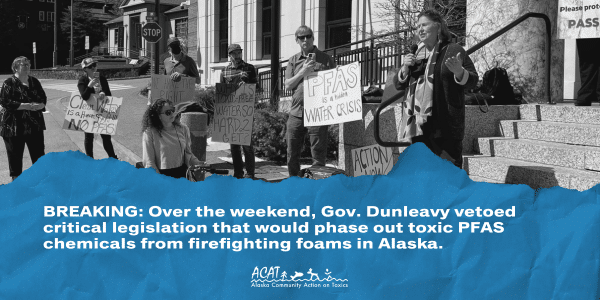Alaska Environmental Justice and Health Advocates Outraged at Gov. Dunleavy’s Veto of PFAS Bill

House Bill 51, which includes legislation introduced by Sen. Jesse Kiehl, has been in development for four years and combines provisions of previous bills to stop PFAS contamination.
ANCHORAGE – Over the weekend, Governor Mike Dunleavy vetoed House Bill 51, critical legislation that would phase out toxic PFAS (per- and polyfluoroalkyl substances) chemicals from firefighting foams in Alaska. The veto is a huge step in the wrong direction and puts our public waters and public health at further risk.
House Bill 51, which includes legislation introduced by Sen. Jesse Kiehl, has been in development for four years and combines provisions of previous bills to stop PFAS contamination. It was passed in the final hours of this year’s legislative session, and only needed the Governor’s signature. House Bill 51 passed the Senate on a 20-0 vote and then passed the House of Representatives 38-2.
The final version of the bill was sponsored by Rep. Stanley Wright and addresses disposal of refrigerants, however the crucial PFAS provisions were included in HB 51 on the Senate Floor following agreements among the bill sponsors. The current language of HB 51 is significantly scaled back from a more comprehensive PFAS bill that was supported by health and environmental advocates and is the bare minimum our state needs to prevent further poisoning of Alaskans’ drinking water with deadly PFAS.
PFAS, a harmful class of over 12,000 substances, are known as “forever chemicals” because they are extremely persistent and have been found in the bodies of people and wildlife. They cause harm to health at extremely low exposure levels, including certain cancers, liver and kidney damage, and immune system suppression. Most contamination from PFAS in Alaskan’s drinking water has been caused by the dispersive use of PFAS-based industrial firefighting foams used on airports and military bases. There are safe, effective, and economical alternatives to the use of PFAS-based firefighting foams that are in use at major airports, military installations, and oil and gas facilities around the world.
“The governor’s unconscionable decision to veto this bill is a complete betrayal to the people of Alaska and will result in further harm to our waters, fish, wildlife, and the health of people throughout the state,” said Pamela Miller, Executive Director of Alaska Community Action on Toxics. “This is an egregious environmental injustice, especially given that the bill was supported by people from affected communities, firefighters, health care professionals, Tribes and Native organizations.”
In a press release from his office, Sen. Jesse Kiehl said, “I contacted the Governor’s office Friday, August 18, asking to meet and discuss the bill and any concerns he might have. I repeated the request to his team on August 24, but all attempts were refused.”
“This veto doesn’t just endanger Alaskans’ health, it risks huge costs to taxpayers. Just one PFAS spill in a village would cost a couple times what this bill’s ‘takeback’ provision does.” Kiehl emphasized most rural villages don’t have the resources to pay for such a cleanup, saying, “That money could only come from the Oil & Hazardous Substance Response Fund, which comes from a tax on ordinary Alaskans’ home heating bills. Governor Dunleavy’s veto will poison Alaskans’ drinking water and empty taxpayers’ pockets tomorrow.”
Alaska Community Action on Toxics (ACAT) conducted independent water quality testing in 2021 and 2022 that showed PFAS contamination in all lakes tested in the Fairbanks North Star Borough and Anchorage lakes well as in Ship Creek. These results show contamination in lakes used for swimming and fishing. The results also show contamination in Ship Creek downstream from Joint Base Elmendorf and Fort Richardson (JBER), an important urban ecosystem for fish, wildlife, as well as fishing.
The Alaska Department of Environmental Conservation identified at least 469 PFAS-contaminated sites in Alaska. These data emphasize the need for urgent action to protect public health as well as wildlife. The data concerning PFAS in our local lakes are of concern to environmental and public health and is a public right-to-know issue.
Contact: Adam Ortega, [email protected]
##
